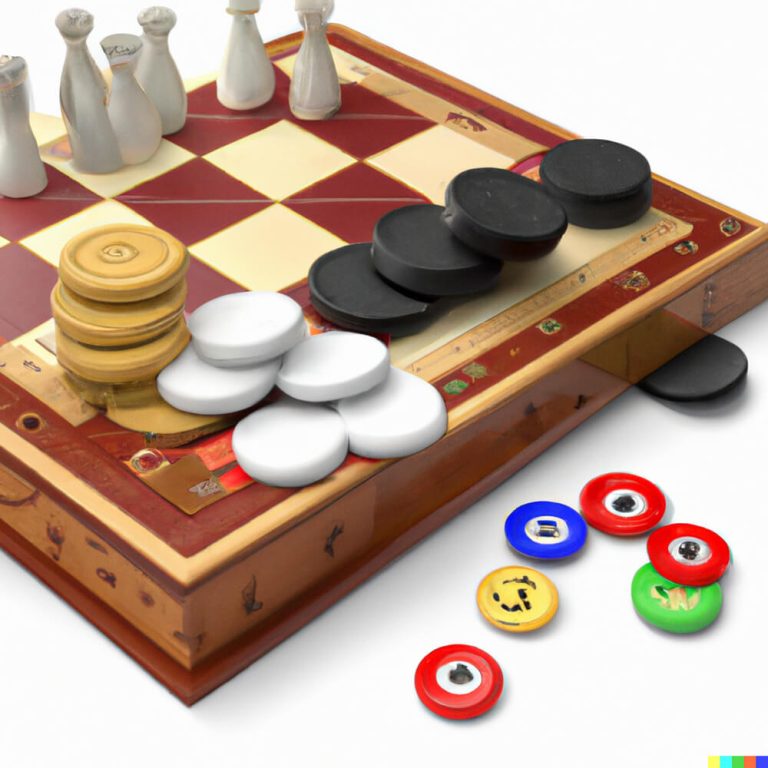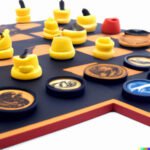Are you a fan of strategy board games? If so, then the Dune Strategy Board Game is definitely worth checking out. This classic game has stood the test of time and continues to captivate players with its intricate gameplay and rich lore. Whether you’re a seasoned veteran or a newcomer to the world of Dune, there’s something for everyone to enjoy in this thrilling board game.
Dune is not just any ordinary board game – it’s an immersive experience that transports players to the desolate yet captivating world of Arrakis. With elements of politics, warfare, and alliances, this game offers a unique blend of strategy and intrigue that will keep you coming back for more. Whether you’re plotting your next move or forming alliances with rival factions, every decision you make in Dune can have a profound impact on the outcome of the game.
In this article, we’ll delve into the history and background of Dune, explore its game components and setup, dissect its gameplay mechanics and strategy, provide an overview of the various factions and their abilities, share tips and tactics for winning, discuss expansions and variants, as well as take a look at the thriving community and competitive scene surrounding this beloved board game. So sit back, relax, and prepare to embark on an epic journey through the world of Dune.
History and Background of Dune
The Dune strategy board game is based on the iconic science fiction novel series written by Frank Herbert. First published in 1979, the game has since become a beloved classic among board game enthusiasts and fans of the Dune series alike.
Set in the fictional universe of the Dune books, the game allows players to take on the roles of different factions vying for control of Arrakis, also known as Dune, the desert planet that is the only source of spice.
The Dune strategy board game is renowned for its rich lore and immersive gameplay, which draws heavily from the intricate political intrigue and power struggles depicted in the novels. The game’s mechanics are designed to mirror the complex alliances and betrayals that characterize the struggle for dominance over Arrakis.
In addition to capturing the essence of the Dune universe, many fans appreciate how well-balanced and strategic the gameplay is, making it a must-try for those who enjoy a deep and engaging gaming experience.
The enduring popularity of the Dune strategy board game can be attributed to its ability to transport players into a world filled with treachery, diplomacy, and warfare. With each faction possessing unique abilities and advantages, players are challenged to think critically and adapt their strategies accordingly. Whether they are working closely with allies or plotting against adversaries, every decision impacts the outcome of this epic struggle for control over Arrakis.
Game Components and Setup
The Dune strategy board game is a thrilling and immersive experience set in the science fiction universe of Frank Herbert’s Dune. The game is designed for 2-6 players and revolves around political intrigue, military might, and savvy negotiation. With its unique blend of gameplay mechanics and deep strategic elements, it has become a beloved classic for board game enthusiasts and fans of the Dune franchise alike.
Game Components
The Dune strategy board game comes with a variety of components that make each playthrough dynamic and engaging. Some key components include:
- Player faction boards representing the noble houses
- Troop tokens to represent your military forces
- Treachery cards to sway the balance of power in your favor
- Conflict tokens for battles over territory control
Setup
Setting up the Dune strategy board game requires careful consideration and planning to ensure a balanced starting position for all players. The setup process involves:
- Selecting player factions and distributing their respective components
- Placement of starting units on the game board according to faction abilities
- Distributing treachery cards to each player to influence their strategies and actions
- Randomly determining the first player to begin the game
Special Considerations
While setting up the game, players must take into account the unique abilities and strengths of each faction, as well as the potential interactions between different factions during gameplay. Understanding these dynamics can be crucial in crafting an effective strategy from the very beginning of the game. The strategic placement of units and allocation of resources during setup can greatly impact your chances of success as you navigate the treacherous world of Dune.
Gameplay Mechanics and Strategy
When it comes to the gameplay mechanics and strategy of the Dune Strategy Board Game, players will find themselves immersed in a world of intrigue, alliances, and intense tactical decision-making. The game is known for its complex and dynamic gameplay that ensures no two games are ever the same. Here are some key elements to consider when diving into the world of Dune:
- Resource Management: In Dune, players must carefully manage their resources such as Spice, money, and treachery cards to ensure they have the necessary assets to carry out their plans.
- Alliances and Betrayals: Players can form alliances with other factions, but these alliances are often short-lived and can quickly turn into betrayals. Knowing when to form an alliance and when to break it is crucial to success in the game.
- Combat and Conflict Resolution: The game features combat mechanics that require careful planning and assessment of risks. Understanding how different factions’ abilities and strengths impact combat outcomes is essential for gaining control of territories on the board.
Developing a winning strategy in the Dune Strategy Board Game requires a deep understanding of each faction’s strengths, weaknesses, abilities, and unique strategies:
- House Atreides: Known for their diplomatic prowess and strong economy, House Atreides excels at forming alliances while also being able to take advantage of information advantage through prescience abilities.
- House Harkonnen: With a focus on brute force and aggression, House Harkonnen excels in combat situations thanks to their strong military units and ability to predict treachery cards played by opponents.
- The Bene Gesserit: This faction specializes in manipulation and influencing other players’ decisions through prediction powers. Their covert actions can greatly impact the course of the game if used strategically.
In addition to understanding each faction, successful players must also adapt their strategy based on changing game conditions, anticipate opponent moves, negotiate effectively with other players, and make shrewd use of treachery cards. Mastering these gameplay mechanics is key to emerging victorious in the world of Dune.strategy board game.
Faction Overview and Abilities
The Dune Strategy Board Game offers players the opportunity to take on the role of one of six factions vying for control of the desert planet of Arrakis. Each faction comes with its own unique abilities and strengths, adding an element of asymmetry to the gameplay experience.
One of the most iconic factions in the game is House Atreides, known for their strong military capabilities and ability to predict future events. Their special ability allows them to look at the top card of spice deck before bidding, giving them valuable insight into the resource economy of the game.
On the other hand, House Harkonnen is known for their ruthlessness and strength in combat. Their special ability grants them additional combat strength when fighting battles, making them a formidable force to be reckoned with on the battlefield.
The Bene Gesserit is another faction that stands out due to their unique win condition. Instead of aiming for outright control of territory, they aim to predict which turn a specific player will win on, allowing them to claim victory if they are correct. This adds a layer of intrigue and deception to their gameplay style.
Overall, each faction in the Dune Strategy Board Game offers a different playstyle and approach to achieving victory, making for a diverse and engaging gameplay experience.
| Faction | Special Ability |
|---|---|
| House Atreides | Ability to look at top card of spice deck before bidding |
| House Harkonnen | Additional combat strength in battles |
| Bene Gesserit | Predict which turn a specific player will win on |
Tips and Tactics for Winning
In the Dune strategy board game, victory is achieved through cunning tactics and strategic decision-making. With each faction vying for control of the desert planet of Arrakis, players must carefully plan their movements and alliances to emerge triumphant.
Resource Management
One key aspect of winning in the Dune strategy board game is managing resources effectively. Players must balance their spice production, military units, and treachery cards to ensure they have the necessary assets to carry out their plans. Additionally, understanding the value of various resources and knowing when to make sacrifices can greatly impact a player’s chances of success.
Alliance-Building
Forming alliances with other players is crucial in Dune. Knowing when to forge an alliance or break one is a delicate dance that can tip the scales in favor of victory. Understanding each faction’s strengths and weaknesses can help players identify potential allies and negotiate favorable terms for cooperation.
Territory Control
Controlling strategic regions on the map is essential for victory in Dune. Players must assess their position on the board, consider potential threats from other factions, and make calculated moves to secure vital territories. A strong territorial presence not only provides valuable resources but also bolsters a player’s influence and bargaining power.
With these tips and tactics in mind, players can navigate the intricate web of political intrigue, military conflict, and resource management to claim dominance over Arrakis in the Dune strategy board game. Victory demands shrewd decision-making, adaptability, and a deep understanding of both the game mechanics and their opponents’ strategies.
Expansions and Variants
The Dune Strategy Board Game has gained popularity over the years, and with that, a number of expansions and variants have been released to enhance the gaming experience. These additions add new elements and challenges to the game, keeping it fresh for both new and experienced players.
One notable expansion for the Dune Strategy Board Game is the “Ixians & Tleilaxu” expansion, which introduces two new factions, each with their own unique abilities and strategies. This expansion also adds new treachery cards, as well as advanced game mechanics that bring an added layer of complexity to the gameplay.
In addition to expansions, there are also fan-created variants of the game that aim to offer different ways to play Dune. These variants may include modified rules, alternative victory conditions, or even entirely new factions. While not officially endorsed by the creators of the game, these variants can provide a refreshing twist for players looking to shake up their Dune gaming experience.
Overall, these expansions and variants add depth and replay value to the Dune Strategy Board Game, making it a more immersive and dynamic experience for tabletop gaming enthusiasts. As new expansions continue to be released and fan-created content grows, the world of Dune expands even further, offering something for every type of player.
| Expansion/Variant | Description |
|---|---|
| Ixians & Tleilaxu Expansion | Introduces two new factions with unique abilities and advanced game mechanics |
| Fan-Created Variants | Modified rules or entirely new factions created by fans for a different gameplay experience |
Community and Competitive Scene
The Dune Strategy Board Game has gained a dedicated community of players and a competitive scene since its release. With its deep strategy, unique faction abilities, and immersive gameplay experience, it has become a favorite among tabletop gaming enthusiasts.
Community Involvement
The Dune Strategy Board Game has brought together a passionate community of players who share a love for the game’s rich lore and intricate gameplay. Players often gather at local game stores, conventions, or online forums to discuss strategies, share tips, and organize tournaments. The sense of camaraderie among Dune fans creates a welcoming environment for new players looking to learn and improve their skills.
Competitive Tournaments and Events
The competitive scene for the Dune Strategy Board Game has been steadily growing, with organized tournaments held at major gaming events and regional competitions hosted by fan communities. These events showcase the highest level of play and attract top players from around the world. The thrill of competing in high-stakes matches adds an extra layer of excitement to the already intense gameplay experience.
Online Play and Rankings
In addition to in-person events, many players also compete in online leagues and tournaments to test their skills against opponents from different regions. Online platforms provide a convenient way for players to engage in competitive play and improve their rankings. Some dedicated fans even maintain leaderboards to track the top-performing players, creating an extra incentive for friendly competition within the community.
Overall, the community surrounding the Dune Strategy Board Game continues to thrive as more players discover its depth and complexity. Whether participating in local gatherings or competing on a global scale, enthusiasts can immerse themselves in the rich world of Dune while honing their strategic abilities through intense gameplay experiences.
Conclusion and Final Thoughts
In conclusion, the Dune Strategy Board Game offers a thrilling and engaging experience for both fans of the iconic franchise and board game enthusiasts. With its rich history and background, detailed game components, and complex gameplay mechanics, this game truly captures the essence of the Dune universe. The various factions each with their unique abilities add depth and replay value to the game, making each playthrough a fresh and exciting experience.
Furthermore, mastering the tips and tactics for winning in the Dune Strategy Board Game requires strategic thinking and careful planning. The expansions and variants available also provide players with even more options to explore within the game, keeping the experience constantly evolving. Whether playing casually with friends or competing in a competitive scene, this game has something to offer for everyone.
Overall, the Dune Strategy Board Game stands as a testament to the enduring legacy of the Dune franchise. Its immersive and challenging gameplay combined with its loyal community make it a must-have for any fan of board games or science fiction. So gather your allies, plot your strategies, and may victory be yours in this epic battle for control of Arrakis.
Frequently Asked Questions
How Do You Win the Dune Board Game?
Winning the Dune board game requires a combination of strategy, negotiation, and careful planning. Players must form alliances, manage resources, and conquer territory in order to control the planet of Dune and ultimately emerge victorious.
Is Dune Board Game Hard to Play?
The Dune board game can be challenging to play for newcomers due to its complex rules and intricate gameplay mechanics. However, with practice and patience, players can learn to appreciate the depth and nuance of the game.
Is Dune a Good Board Game?
Dune is widely regarded as a good board game due to its immersive theme, strategic depth, and intricate player interactions. Fans of the original novel will appreciate how the game captures the essence of Frank Herbert’s universe while offering a challenging and engaging tabletop experience.

I love playing all kinds of games – from classics like Monopoly to modern favourites like Ticket to Ride.
I created this blog as a way to share my love of board games with others, and provide information on the latest releases and news in the industry.





